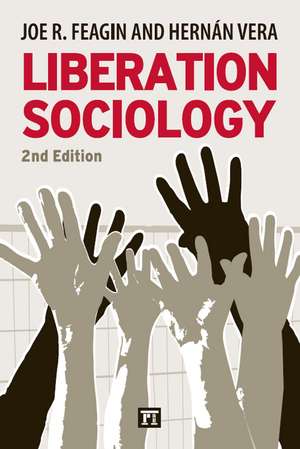Liberation Sociology
Autor Joe R. Feagin, Hernan Veraen Limba Engleză Paperback – 30 aug 2008
Preț: 325.02 lei
Preț vechi: 417.43 lei
-22% Nou
Puncte Express: 488
Preț estimativ în valută:
62.19€ • 65.11$ • 51.46£
62.19€ • 65.11$ • 51.46£
Carte tipărită la comandă
Livrare economică 05-19 aprilie
Preluare comenzi: 021 569.72.76
Specificații
ISBN-13: 9781594516054
ISBN-10: 1594516057
Pagini: 306
Dimensiuni: 152 x 229 x 20 mm
Greutate: 0.5 kg
Ediția:2
Editura: Taylor & Francis
Colecția Routledge
Locul publicării:Oxford, United Kingdom
ISBN-10: 1594516057
Pagini: 306
Dimensiuni: 152 x 229 x 20 mm
Greutate: 0.5 kg
Ediția:2
Editura: Taylor & Francis
Colecția Routledge
Locul publicării:Oxford, United Kingdom
Cuprins
Preface and Acknowledgments -- 1 What Is Liberation Sociology? -- 2 Improving Human Societies: Reassessing the Classical Theorists -- 3 U.S. Sociology from the 1890s to 1970s: Instrumental Positivism and Its Challengers -- 4 Sociology Today: Instrumental Positivism and Continuing Challenges -- 5 Sociology in Action -- 6 Doing Liberation Social Science: Participatory Action Research Strategies -- 7 Liberation Theory and Liberating Action: The Contemporary Scene -- 8 Sociology, Present and Future: Two Sociologies -- 9 Epilogue: The Challenges of Teaching Liberation Sociology -- Notes -- Index -- About the Authors.
Recenzii
“I came away from Liberation Sociology with a sense of renewed hope for the field. . . . Until Liberation Sociology, I found few well-written, cogently presented, and well-researched arguments suitable for the next generation of sociologists. This volume addresses this lack. For every undergraduate student considering entering sociology, for every graduate student wondering about his or her choice, as well as for current sociologists who wonder whether they have lost their way, Liberation Sociology might prove to be a breath of fresh air.”
—Patricia Hill Collins in the American Journal of Sociology
“I've successfully used the first edition in theory classes, and this new edition is even better! Liberation Sociology is to sociology what Howard Zinn's People's History is to U.S. history: an exciting and important revision of 'received history' that will enliven class discussions and validate the noblest motivations for studying sociology. Very highly recommended.”
—Barbara Finlay, Texas A&M University
“Liberation Sociology is must reading.”
—Gideon Sjoberg, University of Texas–Austin
“In this unique book, Joe R. Feagin and Hernán Vera show that sociology can make a vital contribution to human freedom and well-being. Drawing on many practical contributions of sociological researchers and activists, they offer an inspiring vision of the field and its possibilities. This crucial text will be adopted in courses everywhere.”
—Howard Winant, Temple University
“Truly a magnificent, original, exciting, and powerful consciousness-raising book!”
—Bernice McNair Barnett, University of Illinois–Urbana-Champaign
—Patricia Hill Collins in the American Journal of Sociology
“I've successfully used the first edition in theory classes, and this new edition is even better! Liberation Sociology is to sociology what Howard Zinn's People's History is to U.S. history: an exciting and important revision of 'received history' that will enliven class discussions and validate the noblest motivations for studying sociology. Very highly recommended.”
—Barbara Finlay, Texas A&M University
“Liberation Sociology is must reading.”
—Gideon Sjoberg, University of Texas–Austin
“In this unique book, Joe R. Feagin and Hernán Vera show that sociology can make a vital contribution to human freedom and well-being. Drawing on many practical contributions of sociological researchers and activists, they offer an inspiring vision of the field and its possibilities. This crucial text will be adopted in courses everywhere.”
—Howard Winant, Temple University
“Truly a magnificent, original, exciting, and powerful consciousness-raising book!”
—Bernice McNair Barnett, University of Illinois–Urbana-Champaign
Descriere
Liberation sociology is concerned with eliminating social oppressions and creating truly just societies. The authors examine theories and research of social scientists who ask, Social science for what purpose? and Social science for whom? Case studies offer humanistic, democratic, and activist answers.







